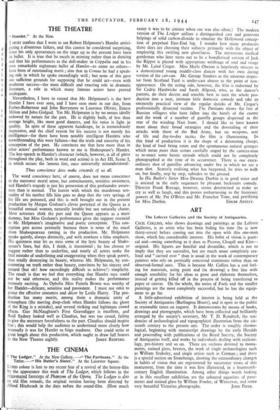THE CINEMA
"The Lodger." At the New Gallery.—t, The Partisans." At the Tatier.-4, Ills Butler's Sister." At the Leicester Square.
LURID colour is lent to my recent fear of a revival of the horror-film by the appearance this week of The Lodger, which follows in the rejuvenated footsteps of Phantom of the Opera. The Lodger is also an old film remade, the original version having been directed by Alfred Hitchcock in the days before the sound-film. (How much easier it was to be sinister when one was also silent.) The modern version of The Lodger utilises a distinguished cast and generous helpings of solid carbon-dioxide to simulate the Hollywood concep- tion of perpetual East-End fog. I wonder how many producers these days are choosing their subjects primarily with the object of employing this swirling new ghostliness. The mysterious medical gentleman who later turns out to be a bowdlerised version of Jack the Ripper is played with appropriate writhings of soul and visage by Mr. Laird Cregar. Miss Merle Oberon is hopelessly miscast as a domesticated young middle-class dancer with her own daring - version of the can-can. Mr. George Sanders as the amorous inspec- tor from Scotland Yard is under-cast almost to the point of non- appearance. On the acting side, however, the film is redeemed by Sir Cedric Hardwicke and Sarah Allgood, who, as the dancer's parents, do their decent and sensible best to turn the whole pro- duction into a neat, intimate little domestic comedy and take an eminently practical view of the regular shrieks of Mr. Cregar's professionally dissected victims. The Partisans shows the fate of Russian villagers who have fallen into the hands of the enemy and the work of a number of guerilla groups dispersed in the rear of the winding Nazi front. I should like to have known more about their broad strategies and the dovetailing of their attacks with those of the Red Army, but on weapons, way of life and day-to-day tactics the film is illuminating. In this kind of production it is the shape of a detonating charge, the kind of food being eaten and the spontaneous natural gestures which mean more than scenes carefully staged by the camera-man to re-enact some heroic episode which could not be completely photographed at the time of its occurrence. There is one extra- ordinary shot of guerillas advancing under fire in which we see a man shot. Scarcely realising what has happened, he tries to walk on, but finally, step by step, subsides to the ground.
In His Butler's Sister Miss Deanna Durbin is in good voice and is assisted in the early sequences by pleasant backstairs comedy. Director Frank 'Borzage, however, seems determined to make us cry as well as laugh, and this proves embarrassing to the histrionic powers of Mr. Pat O'Brien and Mr. Franchot Tone, and petrifying


























 Previous page
Previous page